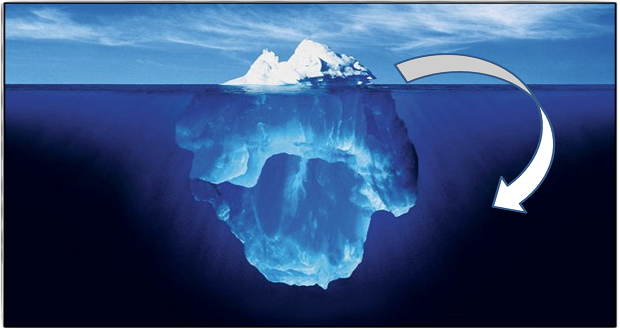
If you’ve ever attended a training course on culture, chances are you’re familiar the infamous “iceberg” metaphor, in some form or another. Well almost a year ago, the esteemed thought leader on culture, Milton Bennett, wrote a blog arguing for the death of the iceberg metaphor, or at least its retirement, which has led to an impassioned string of running comments from culture enthusiasts that agreed, disagreed and fell somewhere in the middle. I won’t even pretend to add anything new to the very interesting and nuanced discussion, but only invite you to follow the link and check it out for yourself.
I do however want to share a few thoughts that are represented by many others in the comments below Bennett’s blog post. The first is, I am of the camp who is not quite ready to give up on the iceberg. I have used the iceberg in both training and educational contexts, and find it useful and intuitive for both instructors and students.
The entire point of a metaphor is to transform a very complex (and usually murky) concept down to its essential elements in order to communicate it to someone else. The inherently complex and hard-to-grasp nature of culture is what warrants a discussion of metaphors in the first place. If you spend some time reading the comments on Bennett’s blog, you will quickly see how nuanced and complex the discussion of communicating culture can be. The problem is, many of the clients we work with or students we teach are either not on this level yet, or have no desire to be. The reason the iceberg has “stuck” for so many people (myself included) is because it visualizes the idea that culture includes a both a physical/material element as well as an immaterial, “invisible” element that is intuitive to people once they see it.
I do think that Bennett raises a great objection, and has been a catalyst for such fruitful discussion. It seems to me his main objection is that the Iceberg metaphor is too “positivist”, static, and evoke feelings of “mystery and danger” (Milton’s comments on 10/5/13). While I agree and I think alternative metaphors like tree, river etc., are also useful, I think it’s important to remember that another element of metaphors is their inherent limits. Of course an Iceberg doesn’t fully communicate all the dynamics of culture. I don’t think any single metaphor ever will. And I think that the responsibility rests on the educator to use the Iceberg tactfully to explain one (or several) element of culture that the Iceberg metaphor does explain. At least for me, that is the very important and foundational idea that culture is both seen and unseen; and the unseen parts of culture are not always easy to grasp.
Lastly, I was recently in a training course on culture where the Iceberg metaphor was brought into question and I was struck by a creative way to use and think about the Iceberg; even given some of its possible shortcomings or challenges. In light of objections that the Iceberg was too simplistic and misleading about two “levels” of culture, a participant responded by elaborating on the often-overlooked dynamics of actual icebergs; that they are a single organic entity that is constantly in flux, both within itself and in the larger body of water it is a part of. But what struck me as most interesting was the explanation of iceberg “flipping.”
I have no idea how this works, but as an ignorant observer, it is fascinating and breathtaking to watch (follow the link above to see for yourself). I do know, that the massive, unseen, “larger” part of the iceberg in this disruptive process instantly emerges from the depths, replacing the once smaller “tip” that was originally out of the water. One way this relates to culture, and to Bennett’s objections, is that the “top” and “bottom” parts of the Iceberg are not static and totally distinct elements. They are, as in culture, connected, “alive”, and always moving. And just because we don’t initially, or always, see the bottom of the iceberg, doesn’t mean that it doesn’t move, and emerge into sight.
I still think the iceberg is a useful metaphor for a foundational understanding of culture (or certain elements of culture) and it can be expanded to creatively include more complex ideas like constructivism or agency. In other words, I’m not yet ready to watch it melt away; I’d rather watch it flip over.


















